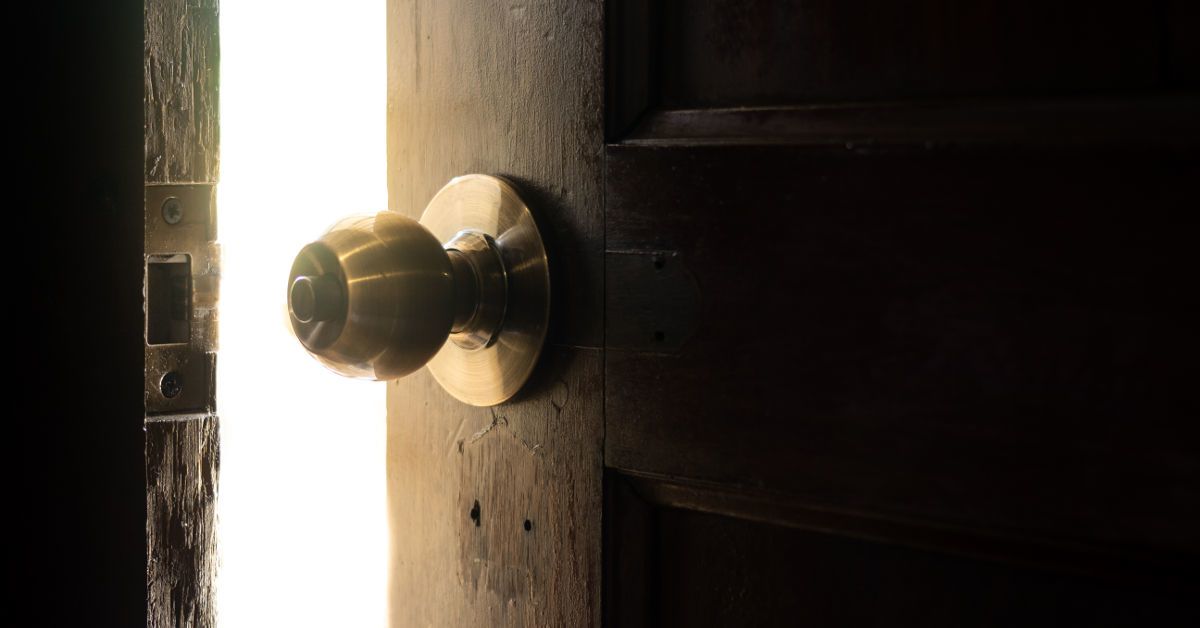On the Threshold

This post was originally published through Patreon on June 13, 2018.
Jeremy stood beneath a torrent of rain, surrounded by the dark. He carried no umbrella, nor did he care that the rain had already soaked into his jacket, his pants, and his hair. Thick, fat drops pounded the street like thundering world-sized drums, but he just continued to stand there, open to the elements, staring at the glowing doorway before him and pondering what might lie beyond.
Despite the glow, the porch light was somehow gray, dim, while the world around it was too vibrant, too bright. This was why he’d come, why he stood before the doorway now without a care for the poor weather. Because for years, he’d known he didn’t belong; for years, he’d believed the world to be an illusion.
How had he come to this conclusion? It had been little things at first, things he didn’t notice all at once: buildings that were too tall, people who were too loud, stars that were too bright. Strange details that snagged his attention, encouraging him to examine the world more closely.
And when he did, it all fell apart. Nothing had changed, yet everything was wrong. Parks populated by thick, bulbous trees with tangled, snarling roots, and trunks that sprouted fuzzy leaves like hair. Broad palisades at the center of the city supported by towering marble columns. Vivid crystalline lakes and ponds that sparkled artificially beneath a too-bright sun. It was as if an amateur artist had loaded the world into Photoshop and cranked up the contrast. Everything was too large, too bright, every line and dimension exaggerated like a comic or a cartoon.
He used to hear depressed people say that the world felt too gray, too fake. But until the day his eyes were opened, he’d never thought the world could feel too real.
He had no concrete memory of how the world should be. He only knew that this was not his true home, that somehow, he had to find his way back to where he belonged.
And now, this doorway. It felt ordinary in all the ways the rest of his surroundings did not. Not too large, not too small; not too flashy, not too bright. Ordinary. It called to him, begged him to plumb its hidden secrets. Now that he was ready to open the door—now that he was ready to walk through it and beyond—he wondered what might exist on the other side.
A way back to where I belong. A way home.
Only he’d already been standing here for more than an hour, and still he had yet to open the door. Why? He was certain the answer to his questions lay beyond its narrow borders. Perhaps he was afraid. Afraid something was wrong in his head, that all his strange observations were nothing more than the final desperate cries of a failing mind. After all, it did sound crazy when he thought about it, this world that felt so different from how it was supposed to be even though he couldn’t remember how it was different or why. And what if he wasn’t crazy? What if he opened the door and stepped into someplace new? Would he know how to live in such a place, or would he be even more lost than he felt right now?
Jeremy shook his head. He had to go. He had to know the truth. He stepped forward, feet squelching in his rubber shoes, and placed his hand on the cool brass knob. This was it. He was going to open the door, was going to find out if he was crazy. All he had to do was turn the knob.
There was a brief pause, a moment suspended on the precipice of a life-altering decision. Then Jeremy turned away, too afraid to go further.
Tomorrow. I can do this tomorrow.
But he knew as soon as he turned back that this was a lie.
Enter your email address and click "Submit" to subscribe and receive The Sign.
